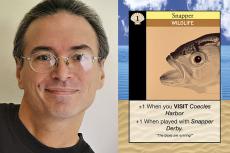Two years after enacting a moratorium on construction of new residential docks and other structures on waters under their jurisdiction, a committee of the East Hampton Town Trustees shared its recommendations for a new policy with the full board at a meeting on Monday.
The moratorium on permitting and approval for construction of residential docks, catwalks, floating docks, floating structures, and platforms was enacted following the trustees’ split vote to permit construction of a floating dock on Three Mile Harbor, the first such approval in more than 30 years. The trustees have used the moratorium to conduct a survey and inventory of all such structures, seeking to discover where docks were constructed or expanded without their permission.
The moratorium is scheduled to expire on Dec. 31, but the trustees banned applications for docks in most waterways under their jurisdiction in 1984, extending the prohibition to all but the eastern shore of Three Mile Harbor in 1987. The trustees held a public hearing on their developing plans to enact a new policy, including a possible permanent prohibition on new docks in Three Mile Harbor, on Nov. 13. That hearing drew comments from five residents, all of whom have docks already.
Francis Bock, the trustees’ clerk, read the findings, goals, and recommendations as enumerated by the committee. With respect to dock charges, the trustees have used different methods of charging for annual agreements. The goal is to create uniformity across all harbors and for all agreement holders. The recommendation is for $1 per square foot with a minimum charge of $150 — the present charge is $4 per linear foot — and for freestanding pilings and other pilings not supporting fixed docks to be charged at $18 per piling.
Where the trustees’ survey revealed a dock of a different size than was permitted, indicating a likely unpermitted expansion, the recommendation is to provide a path to compliance by way of a notice granting the agreement holder six months from the date of notice to submit an application to reconcile the existing permit. Those who do not would risk denial of a permit to bring the dock into compliance, and the trustees would reserve the right to require the noncompliant portion to be removed.
For residents who have an annual dock agreement but have never built or installed one, the recommendation is similar: a notice and a six-month window to apply to renew the original construction permit. Once renewed, it would be valid for one year with the permittee allowed up to two additional renewals. If a dock has not been installed after two renewals, further renewals may be denied and trustee permission to build a dock forfeited.
The formula would also apply to owners of dilapidated docks. Where an inspection revealed a dock in a poor, unsafe, or otherwise unusable condition, owners would receive a notice and a sixmonth span to submit an application to renovate or reconstruct the dock. The permit would be valid for a year with up to two renewals, but if no action were taken the trustees would retain the right to deny further renewals and owners may be required to remove the existing dock.
The committee also recommended that unpermitted and delinquent docks discovered during the survey be similarly reconciled: a notice informing the owner that the dock is unpermitted and noncompliant with trustee policy, with six months to submit an application to legalize it. The trustees would decide on a case-by-case basis whether to approve a request to legalize the dock, based on evidence presented by the owner.
Should unpermitted dock expansions be discovered in the future, the same recommendation holds: a notice and six months to submit a permit application to bring the dock into compliance, or denial of the application and a requirement that the expansion be removed. These applications would receive heightened scrutiny.
Because it has proven challenging for trustee staff to obtain a new owner’s contact information after a property changes hands, the committee recommended adding a clause to the annual agreement to notify the trustees of an agreement holder’s intent to transfer their property, with the buyer’s information included. Failure to provide that notice of intent to transfer could result in forfeiture of the right to maintain the annual agreement.
With a current dock inventory baseline established, the committee recommends continued monitoring of shoreline structures by way of aerial inspection every two to three years. A drone photographer would be contracted to take aerial images of docks on the inventory list and document any docks not on the list. Field inspections would also occur every six to 10 years.
Seeing a need to develop a consistent policy regarding pilings, the committee recommended that they may remain installed year round at the owner’s discretion, consistent with town code. Freestanding pilings and those used to support floating docks and seasonally removed components would be assessed an annual fee of $18 each. Pilings supporting fixed portions of a dock would not incur any charge.
The committee also recommended that floating docks, removable ramps, walkways, or other movable dock components must be removed no later than Dec. 1. It made no recommendation as to what would happen if they were left in the water. “We have to work with Marine Patrol and the town on that,” John Aldred said on Monday, as the trustees have no enforcement authority.
In Georgica Pond, the trustees have approved several applications for floating platforms or bottom steps despite the prohibition on new docks put in place there in 1984. The committee did not issue a recommendation regarding closing that loophole, sparking a debate between Mr. Aldred and Jim Grimes. The former advocated prohibiting them: “My thought is that these structures are in effect docks, just called another name. We want a consistent policy, I’m in favor of declaring them docks.” Mr. Grimes cited some properties’ bluff shorelines where, “unless you have some sort of structure, you’re just going to further degrade that bluff in order to get to the pond.” The matter will be settled when the trustees vote on the recommendations at the their next and final meeting of 2023, on Dec. 11.
Finally, with respect to a prohibition on new docks in the remaining unprohibited portion of Three Mile Harbor, the committee did not issue a recommendation. The trustees’ long discussion of the question did not reveal which way they are likely to vote.
Two resolutions will be prepared for the trustees’ Dec. 11 meeting, one regarding extending the prohibition on new docks and another on the other policy recommendations. Any items that do not pass will be struck from the resolution.



